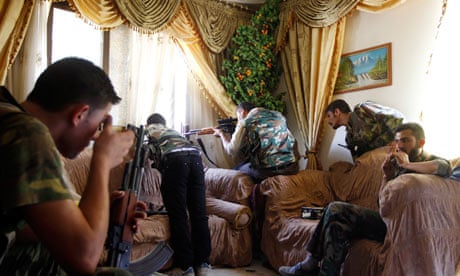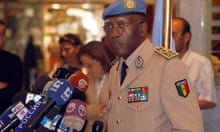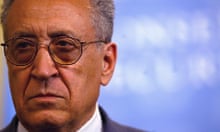The conflict in Syria has divided Syrian families, mine included. While my mother and I usually see eye to eye on Arab politics, Syria has caused heated debate between us. Our differences are not along the black and white lines of pro- or anti-regime, as many prefer to view the issue, but revolve around the likely after effects.
My mother's concerns stem from a deep-seated suspicion of foreign (particularly western) interference in the Arab world – a suspicion validated by history – and the fact that her family belongs to two of Syria's numerous minorities: Christians and Armenians.
I grew up on heartwarming stories of my mother being raised in a tolerant, secular society, where people of all faiths intermingled freely and happily. She speaks with nostalgia of helping her Jewish neighbour in Aleppo during the Sabbath, and of her marriage to my late father – a Muslim – during which religion was never an issue between them, or their families. These fond memories, and the increasingly sectarian nature of the conflict, shape her views.
In a cruel twist of fate, my relatives in Aleppo – proud Syrians – are now forced to flee their homeland, the country that gave their parents' and grandparents' generations hospitality and sanctuary from Ottoman Turkish forces. In our regular phone calls they tell us of terrifying experiences that paint a picture of growing extremism that is under-represented in media coverage.
My mother's concerns over sectarianism were first raised during George Bush's "war on terror", which she blames for intentionally radicalising people of all faiths and ethnicities across the Middle East to enable a policy of divide and rule, including in Syria, which she has visited annually ever since she left the country decades ago.
To her, Syria's revolution has accelerated an existing trend because those powers that have traditionally espoused sectarianism in the region are intimately involved, under the false guise of democracy and human rights. She believes Syria is headed for the type of vicious civil war seen in neighbouring Iraq just a few years ago, and in neighbouring Lebanon before that.
I understand and sympathise with most of her views, and share her concerns about developments in Syria, particularly in the light of the difficulties that more homogenous Arab societies have recently faced when overthrowing their dictators.
Despite all that, though, I still firmly believe in the need for Bashar al-Assad and his regime to go. There is simply no feasible or acceptable scenario whereby he and his party can continue their decades-old, repressive, totalitarian rule.
Bashar may be secular but, like his late Iraqi counterpart Saddam Hussein, he is an equal opportunities oppressor, and the rich history of coexistence in both countries was not created by the Ba'ath parties. Indeed, my mother's inclusive childhood predates the Assad dynasty.
If a post-Assad Syria is to avoid the abyss of civil war, under no circumstances should minority rights be hindered. However, while it must be acknowledged that support for Assad is not limited to minorities, and opposition to him does not come solely from the Sunni Muslim majority, there are those who resent what they see as minorities' complicity or silence regarding his crackdown.
At the same time, one cannot ensure minority rights by repressing the majority (as has happened to Syria's Sunnis) – that, too, is a sure way to civil war. So it is incumbent on the opposition to reassure the minorities, and incumbent on minorities to stand with their revolutionary compatriots. Basically, the rights of all should be considered, respected, and treated as equal.
Unfortunately, the opposition has been divided from the outset and has failed to come up with a unified vision for post-Assad Syria. Continued defections from the government and army, while boosting opposition morale, have also raised suspicions about the motives of some recent defectors, and added to the ranks of those with differing agendas and backers seeking possible leadership roles.
Furthermore, the Free Syrian Army has become something of a franchise that covers all manner of fighters without a unified command and control structure. This has led to credible reports of human rights abuses and possible war crimes, such as the execution of Assad loyalists and the targeting of state media.
If opposition tactics become no better than those of the regime, the legitimate goals and aspirations of the revolution will be lost, morally and practically.
The regime has cynically played on sectarian fears to maintain its rule, with some in the opposition at times taking the bait.
Assad's brutal reaction to the revolution made its militarisation inevitable: with the continued killings of peaceful protesters, calls for reform became demands for regime change, those who preferred a peaceful transition saw the need to defend themselves, and an insistence against foreign help turned into pleas for assistance.
The crisis in Syria has gained a sinister momentum that the best of intentions may no longer be able to stop. It is high time to end the "finger-pointing and name-calling" that caused Kofi Annan to resign as the UN and Arab League envoy to Syria, and to acknowledge that there is no single narrative to the conflict.
Just as the disagreements in my own family will never cause animosity between us, so too must differences in wider Syrian society be treated as among one family. Of course this is easier said than done under the present circumstances, but it must be done – the very social fabric of the country is at stake. What we need is reflection and sanity on all sides before it is too late.
To use the analogy of the Middle East as a playground for outside powers, the situation in Syria is akin to onlookers egging on two people to fight. Syrians must keep in mind that it is those who are fighting, not those encouraging them, who will bear the scars.



